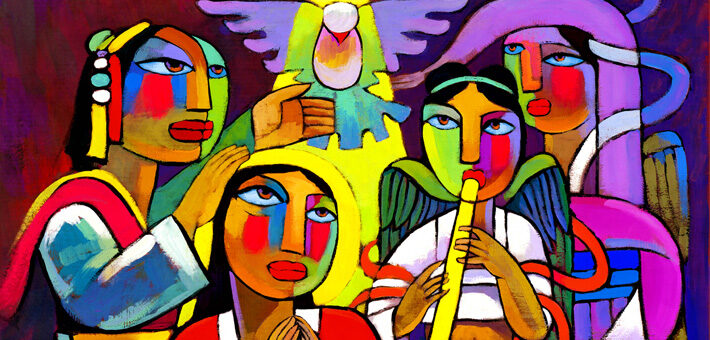Commentary on Isaiah 43:1-7
“But now” — hear the jarring declaration of reversal (43:1). Whatever has gone before is now swept away.
To proclaim the good news in this passage, the preacher must understand and convey the desolation that precedes it: God “gave up Jacob” (42:24). God poured out on God’s chosen people the heat of divine judgment, burning them with the fire of war (42:25). Forsaken, brutalized, and conquered, God’s people became prisoners in foreign lands, where no one, not even God, would claim them. No one would speak for them and say, “They are mine, give them back to me, free my people” (42:22). The new divine word — “But now” — breaks the devastating silence that haunted God’s people through generations in exile. The new word announces an end to judgment and proclaims the promise of life from captivity and death.
Yet while God promises to speak to the nations and demand the return of God’s own (43:6), the gulf, the hurt, and the silence between God and God’s scattered and distant people demand that God speak first to Israel, in language that proclaims again and again the intimacy between them.
The preceding chapter named God as creator of the heavens, the earth, and all people upon it, source of breath and life for humankind (42:5). Now God reveals the divine self strictly in relationship to God’s chosen ones. The God who speaks the new word of freedom, life, return, and redemption is “the creator-of-you, Jacob,” “the shaper-of-you, Israel” (verse 1). This is the transcendent God whose word created all that is good (Genesis 1). This is also God the potter — immanent, intimately present with God’s creatures — who formed humankind from the clay of the earth and breathed God’s own spirit of life into the human’s mouth (Genesis 2:7). This God will declare to Israel, “I shaped you for myself” (Isaiah 43:21). Like the book of Genesis, Isaiah moves from a panoramic view of God’s universal providence to focus on the radical particularity of God’s love for Israel.
And so in these verses God speaks to God’s people not like a king on a throne pronouncing an edict, but like a lover whose heart is bursting, who has waited an eternity just to say their name. In this act of speaking their name, God claims Israel as God’s own and sets them free. “You are mine” means also “I have ransomed you” (43:1). Maker, lover, and redeemer, God will pay any price and overcome every obstacle to be reunited with God’s own.
God says to Israel, “You are precious in my eyes, you are honored, and I have loved you” (verse 4). What does it mean to be precious? When we consider other biblical passages where someone is declared precious in the eyes of another — or where this status is in question — we realize that God’s declaration of love for Israel is no mawkish treacle, nor should it be preached in sentimental fashion. It is a matter of life and death. When Saul realizes that David spared his life, he declares, “My life was precious in your eyes today” (1 Samuel 26:21). Later, one of Ahaziah’s captains begs Elijah to intercede for him and his men in order to preserve their life from the fire of divine judgment. He pleads, “Let my life be precious in your eyes” (2 Kings 1:14). When Ahaziah’s petition is denied, his life is forfeit. The outcome makes the meaning of the phrase clear: to be declared precious means to find mercy, a stay of execution.
But even if one finds mercy, “precious” literally means there is a price, a ransom that must be paid. God’s love for Israel prompts God to redeem them, and this is good news, but this love is costly. The psalmist declares, “Precious is the ransom of a life” (Psalm 49:8), so valuable that no one can pay the price to redeem her own life (Psalm 49:7). And because Israel cannot redeem themselves, God will pay their ransom.
What is the cost? Here is the shock of God’s love. God declares, “I have given the price of your life: Egypt” (verse 3). The regions of Cush and Seba are also named, in parallelism to Egypt, as an exchange for the life of Israel. Later, God raises the stakes further still: “I give Adam, humankind, in exchange for you, peoples for your life” (verse 5). God loves this one people, Israel, so fiercely that God will give all others to win their freedom.
Yet by loving Israel, God does not abandon Egypt. Egypt’s story with God contains far more than this one moment. Isaiah 19:22 tells us that, as with Israel, so with Egypt, God wounds and heals. God promises to listen to Egypt’s voice and heal them, and they too will worship the Lord and be a blessing; God calls them “my people” (Isaiah 19:22-25).
Later, Isaiah pictures people of Egypt, Cush, and Seba coming to Israel in chains, bringing with them the wealth of their lands (Isaiah 45:14). They bow down and make supplication, acknowledging God just as God had promised. It appears that they have come to present themselves as slaves to the Israelites, reversing the earlier relationship of Israel’s slavery in Egypt (cf. Isaiah 52:4). God tells Israel, “they will be yours” (Isaiah 45:14). But remember what it meant when God said to the prisoner Jacob, “you are mine.” Not slavery, but freedom. Egypt, Cush, and Seba will come to Israel not to be enslaved, but to be freed from their chains. They proclaim God as “Savior” (Isaiah 45:15).
Isaiah’s understanding of salvation is filled with tensions: the God of glory, Creator and Savior of all, speaks here to one people in particular with longing and determination. In preaching this passage I would keep God’s broader plan of salvation in view, while focusing attention on the shocking particularity of God’s love for this one people, Israel, for whom God would pay any price.


January 10, 2010